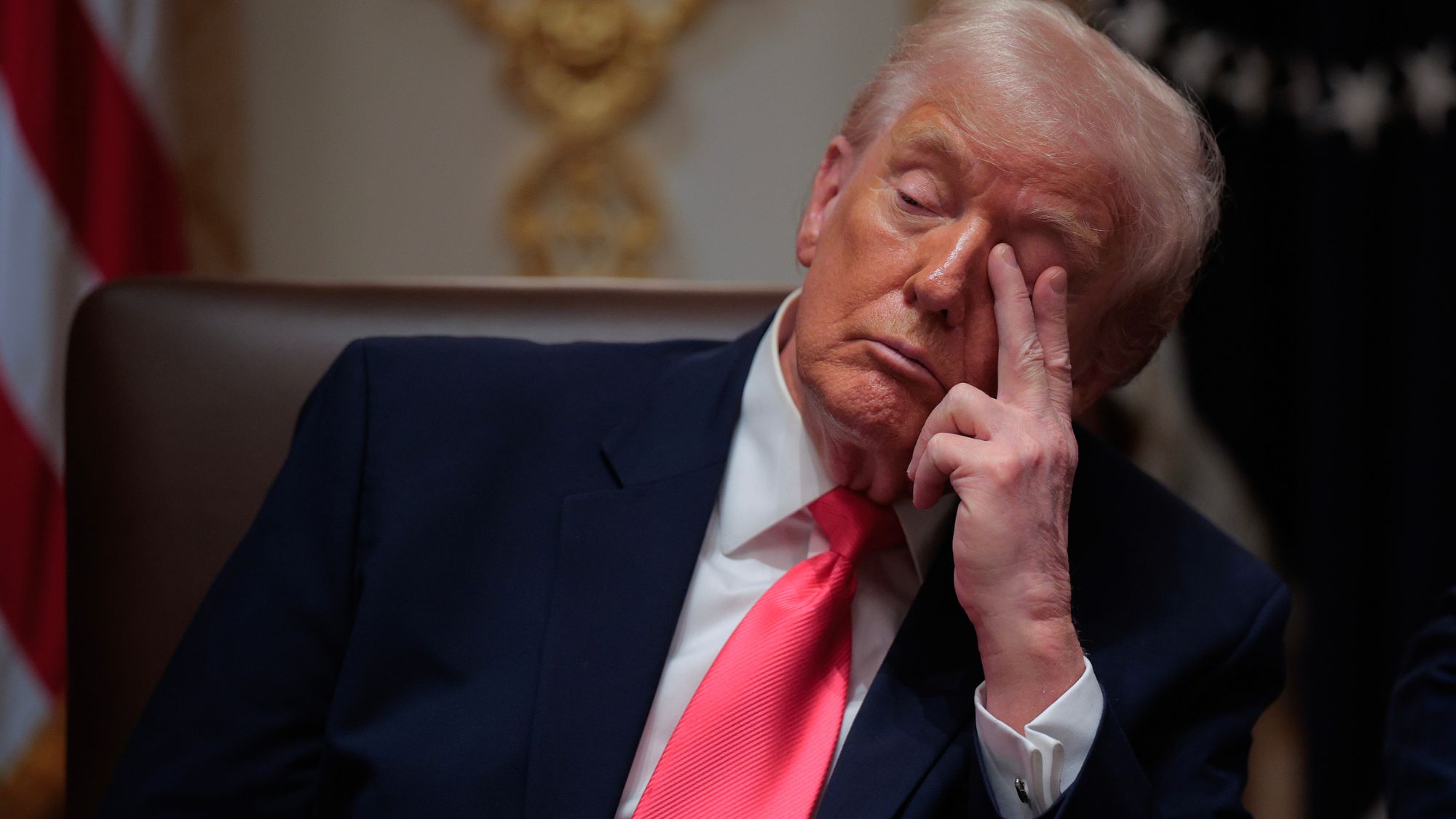Why is Elizabeth Warren falling in the polls? Blame Medicare-for-all.
Voters simply aren't convinced they won't get stung, no matter how gradual the phase-in


A free daily email with the biggest news stories of the day – and the best features from TheWeek.com
You are now subscribed
Your newsletter sign-up was successful
Before Elizabeth Warren had "a plan for that," the GOP had its own man with a plan. A decade ago, Paul Ryan championed a "roadmap" to curb the national debt and rein in entitlement spending through free-market reforms of the big programs that benefit the elderly. Republicans seemed to buy in: Despite Democrats labeling his "Path to Prosperity" plan a cruel austerity program that would hurt seniors, Ryan rode this ambitious budget blueprint to two committee chairmanships, a vice presidential nomination and the House speakership.
But the triumph of the Ryan plan did not last long. The former speaker is out of Congress and Republicans no longer control the House. The Republican president of the United States, Donald Trump, pointedly rejected Ryan's proposals to retool Social Security and Medicare. Entitlement reform is once again the third rail of American politics; Democrats want to expand rather than cut these programs to cover still more people.
History may be about to repeat itself in the form of Warren, the senator from Massachusetts vying for the 2020 Democratic nomination with her promise of "Medicare-for-all" and a move away from most private health insurance. Warren rocketed to near-frontrunner status only to fall in recent polls. There are many factors driving her decline, but it undeniably coincides with the increasing unpopularity of replacing existing health-care arrangements with an expanded Medicare (as opposed to letting people choose to buy into a public option).
The Week
Escape your echo chamber. Get the facts behind the news, plus analysis from multiple perspectives.

Sign up for The Week's Free Newsletters
From our morning news briefing to a weekly Good News Newsletter, get the best of The Week delivered directly to your inbox.
From our morning news briefing to a weekly Good News Newsletter, get the best of The Week delivered directly to your inbox.
As Warren soared, Democrats who haggled with her over the price tag of "Medicare-for-all" and the feasibility of her progressive policy agenda — with the significant exception of former Vice President Joe Biden — appeared doomed to also-ran status. Former Maryland Rep. John Delaney lost his eligibility for the debate stage as Minnesota Sen. Amy Klobuchar struggled to hang on. But by the end of November, Warren toppled by 14 points to a virtual tie for third place in Quinnipiac's national poll with Vermont Sen. Bernie Sanders as Biden reclaimed the lead, with South Bend, Indiana, Mayor Pete Buttigieg — newly re-tacking to the center — rounding into second. Warren has also tumbled to third place in the RealClearPolitics polling averages for Iowa and New Hampshire while trailing Biden in both Nevada and South Carolina.
At the same time, according to Quinnipiac, only 36 percent of voters deem Warren's version of Medicare-for-all a "good idea," and 52 percent think it is a "bad idea." As recently as August 2017, the split was 51-38 in Warren's favor.
Indeed, the same problem that plagued Ryan's big ideas seem to be plaguing Warren's: People don't like it when their existing entitlements are disrupted. This is especially true of health care, whether it is interrupted by more government (think ObamaCare) or by attempts to reduce government (think Trump-era efforts to repeal ObamaCare). As Ryan's downfall shows, no matter how gradual the proposed phase-in of new such policies, voters simply are not convinced they won't get stung, and Warren is grappling with this reality now.
Now, just as establishment Republicans began to entertain second thoughts about following Ryan's roadmap, the public's turn on Medicare-for-all has spooked other Democratic contenders. The candidates who have jumped in late, such as former New York City Mayor Michael Bloomberg and former Massachusetts Gov. Deval Patrick, are skeptics of this leftward economic shift. The party knows it can run to the left of Bill Clinton and win nationally — Barack Obama did it twice. Democrats are now grappling with whether they can run to the left of Obama and do the same. Polling might suggest they cannot: Quinnipiac found that only 14 percent of Democrats and Democratic-leaning voters think Obama was not liberal enough, while 80 percent found the 44th president "just right."
A free daily email with the biggest news stories of the day – and the best features from TheWeek.com
One of Warren's problems is that she has been unwilling to acknowledge the middle-class tax increases her plans will certainly entail, refusing to give her opponents the televised "gotcha moment" as she remains steadfast the insurance cost savings will offset this burden. Yes, Warren is right that Americans are unsatisfied with the costs of the current health-care system. And Ryan was correct that the math of our existing entitlement programs doesn't add up. But whether your solution is a greater federal role or better functioning markets, the transition is politically challenging, no matter how good your plan.
Want more essential commentary and analysis like this delivered straight to your inbox? Sign up for The Week's "Today's best articles" newsletter here.
W. James Antle III is the politics editor of the Washington Examiner, the former editor of The American Conservative, and author of Devouring Freedom: Can Big Government Ever Be Stopped?.
-
 The ‘ravenous’ demand for Cornish minerals
The ‘ravenous’ demand for Cornish mineralsUnder the Radar Growing need for critical minerals to power tech has intensified ‘appetite’ for lithium, which could be a ‘huge boon’ for local economy
-
 Why are election experts taking Trump’s midterm threats seriously?
Why are election experts taking Trump’s midterm threats seriously?IN THE SPOTLIGHT As the president muses about polling place deployments and a centralized electoral system aimed at one-party control, lawmakers are taking this administration at its word
-
 ‘Restaurateurs have become millionaires’
‘Restaurateurs have become millionaires’Instant Opinion Opinion, comment and editorials of the day
-
 The billionaires’ wealth tax: a catastrophe for California?
The billionaires’ wealth tax: a catastrophe for California?Talking Point Peter Thiel and Larry Page preparing to change state residency
-
 Bari Weiss’ ‘60 Minutes’ scandal is about more than one report
Bari Weiss’ ‘60 Minutes’ scandal is about more than one reportIN THE SPOTLIGHT By blocking an approved segment on a controversial prison holding US deportees in El Salvador, the editor-in-chief of CBS News has become the main story
-
 Trump’s poll collapse: can he stop the slide?
Trump’s poll collapse: can he stop the slide?Talking Point President who promised to ease cost-of-living has found that US economic woes can’t be solved ‘via executive fiat’
-
 Has Zohran Mamdani shown the Democrats how to win again?
Has Zohran Mamdani shown the Democrats how to win again?Today’s Big Question New York City mayoral election touted as victory for left-wing populists but moderate centrist wins elsewhere present more complex path for Democratic Party
-
 Millions turn out for anti-Trump ‘No Kings’ rallies
Millions turn out for anti-Trump ‘No Kings’ ralliesSpeed Read An estimated 7 million people participated, 2 million more than at the first ‘No Kings’ protest in June
-
 Ghislaine Maxwell: angling for a Trump pardon
Ghislaine Maxwell: angling for a Trump pardonTalking Point Convicted sex trafficker's testimony could shed new light on president's links to Jeffrey Epstein
-
 The last words and final moments of 40 presidents
The last words and final moments of 40 presidentsThe Explainer Some are eloquent quotes worthy of the holders of the highest office in the nation, and others... aren't
-
 The JFK files: the truth at last?
The JFK files: the truth at last?In The Spotlight More than 64,000 previously classified documents relating the 1963 assassination of John F. Kennedy have been released by the Trump administration
